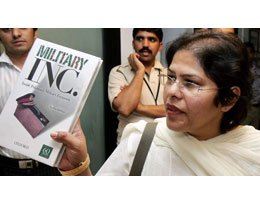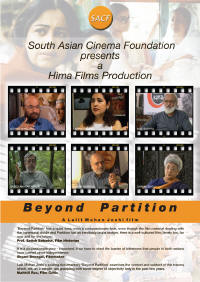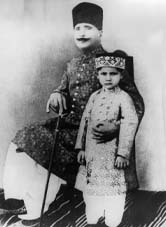More T2F evenings
The hall was packed for 3 recent sessions at T2F: Ardeshir Cowasjee, Ayesha Siddiqa, and Javid Iqbal (Retired Chief Justice and the youngest son of Allama Iqbal), whose session was preceded by a documentary called Beyond Partition.
Ardeshir's session has been covered well (like most things) on Jehan Ara's blog. And his advice to young Pakistanis ("Leave. Or suffer.") made the Indian press - quoting the Daily Times (where it made the Karachi Edition, only!) - just hours after he uttered these words. *** Ayesha Siddiqa & the Oxford University Press, as many of you know, had trouble launching her book (Military, Inc.) in Islamabad. While no 'ban' was placed upon it, pressure from the powers that be prevented them from organizing the event at almost every place they tried. The book, for days, was sold almost under the counter by stores that carried it, for fear of offending the unnameable. T2F was unofficially told by the co-organizers at the time of the event that that there were "no guarantees" that it would not get into trouble. Often, such threats - like virus hoaxes that flood our eMail boxes - are more in the minds of the people. But, as the saying goes: "Just because you are paranoid, it doesn't mean they are not out to get you!" Ms. Siddiqa, while a good conversationalist, with a very pleasant personality, had very little to add to what her study has already revealed. She certainly did not venture into providing more revelations - though she did fill in some details. Her response to many questions was that the questioner read the book first. This was by no means a cheap way to promote her book (already OUP's biggest/fastest seller to date, not counting their reference books). People seemed to constantly ask questions about parts they thought (gathered through hearsay) were in the book - while, often, the view she had expounded in it was quite the opposite of what she was being lumped with. The session was rather limp, I thought - and not because the author was. Members of the packed audience kept asking her how we ("we the people") could stop the army swindles, what could be done to send the army back to the barracks, and more such stuff, as if writing this book had now made her the Oracle of Delphi. There were a couple of amusing energetic exchanges (with the energy generated being more Heat than Light) when certain people insisted upon being heard and the moderator, Tammy Haq, thought they were being irrelevant or delivering speeches, rather than asking questions during the Q&A. I believe a discussion of the rumours that she and OUP had been threatened or were about to be sued would have added some fun ... (Digression: Mushtaq Yusufi says, "Pakistan is unique in that most rumours about it are true.") ... But such topics were not broached, for obvious reasons. Ardeshir, among the audience (he's a frequent T2F visitor) had his usual cynical interjections, which I enjoyed. What did come across from the session was that the most popular military personality among civvies was General Dissatisfaction. *** Beyond Partition turned out to be a good example of a well-made garden variety documentary. It offered a collage of scenes from old and new films interspersed with interviews of Directors, including Shyam Benegal and Sabiha Sumar. Though not ground-breaking in terms of either the format or presentation, it nonetheless held the audience's attention, specially that of the rather large young shanaakht-searching group present who were not familiar with many of the movies discussed or quoted. I'd say, it was certainly worth a viewing. Shyam Benegal's assertion near the end of the documentary that there are 3 Indias - the Geographical, the Cultural, and the National - may be true (as it would be for most large countries) ... but to state that the last-mentioned category included Pakistan and Bangladesh was, IMHO, way out of line. I would have accepted - within certain parameters - his view if he had placed the two neighbouring chips of the old block together in the second category. The trouble is the widely-held Indian belief that the 2-Nation Theory failed after BD separated - and I come across this among a variety of people in my trips to India as well as among some Pakistanis - always seems to assume that its failure means we really were one nation. Sure, the 2-Nation Theory has many detractors and some questionable aspects accordin to them, but the formation of BD could equally well have proved that we are 3 or --- with the passage of time and the further inevitable break up of large groups of people into smaller ones --- even more nations. (Anyway, I am no one to speak of these matters since I do not accept ideas of nationhood and identity in the way they are promulgated, anyway.) The session that followed --- and lasted well after the formal one (moderated by Mujahid Barelvi) was over --- started with Justice Javid Iqbal (JI, from now on) explaining in his still-youthful (at 81!) and passionate manner how Pakistan's current flirtation with Islamic Fundamentalism is a far cry from the view of the Muslim Reformationists (Sir Syed Ahmad Khan and Dr. Allama Iqbal, to name two) who were the catalysts of the final ideas that led to Jinnah sahab's proposals. He also emphasised that the country came about because of Nehru's (and the Congress Party's) obstinacy and conspiracy, more than Jinnah's doings since Jinnah had been an apostle of Hindu-Muslim unity and would not have wanted to see India break up. Much of what JI said, apart from the above - and the intermittent references to progressive Islam - was the stuff of books and the young members of the audience seemed less interested in it than they were in their own questions. Many were heavily critical of the people and ideas that earlier generations have held in official high esteem and never questioned. It seems that, despite our break-away from Hindu-dominated India, we have many more sacred cows here, which brings to mind Bhutto's classic quip when he trounced JI in the elections in their co-constituency in Lahore. "I have slaughtered the sacred calf", announced an exuberant ZAB. Matters that he did not (or could not) tackle were those that questioned the vision - or the alleged lack of it - of the Founding Fathers and the inevitability of a feudal-run state when almost the entire leadership among the Muslims was beleaguered with Nawabzaadahs, Knights, Chaudharis, and Sardars. The very first comment that came from a young blogger attending the event stated that the 'leaders' had no 'connect' with the people they professed to lead and, like in Manto's famous Toba Tek Singh, many just became Pakistanis overnight in the interior of Punjab, without really knowing or understanding what Pakistan meant. Equally inevitable, it seemed to some, was the fundamentalist-leaning nature of a state created through a separation on the basis of communities that differed from each other primarily (if not solely) in religio-cultural practices. A secular Pakistan would most certainly have been a strange thing to carve out of a secular India. An activist wondered aloud whether the Hindu majority - had India been left undivided - could have really trounced or even ignored entirely a sizeable Muslim minority, given that the population of Muslims in India would have been 3 times its current figure with Pakistani and Bangladeshi populations added. The most alarming remark that JI uttered was in response to the question that, though asked by one young person, echoed the thoughts of many: To what do we owe the mess that Pakistan is in? Without batting an eyelid, JI's odd - and totally ludicrous - retort was, "The young. Because they have strayed from the values and goals." C'mon, Sir. With apologies and reverence for your seniority, may I remind you that you have meted out Justice; You have been in a position that requires unemotional, cool, logical thinking before passing such sweeping judgements. Be willing to accept that your generation (and mine) passed little to the young in any form or shape worth keeping or being proud of. Corruption, nepotism, lawlessness, slavish boot-licking of foreign powers for personal gains, indecent politics, loot-maar, apathy, personal glorification, hypocrisy, hero-worship, martial-laws, horse-trading, continuing class wars, provincialism, the worst aspects of nationalism, sectarianism, ethnic and linguistic strife, destruction of institutions, and worse, is all they have seen while growing up. Fortunately for us (and them), there are a few people like Edhi still around (and like Akhtar Hameed Khan in the recent past) for them to understand that even one person can make things happen. This is what will keep their activism and spirits alive. These are the people whose biographies should replace those of trivial personalities in textbooks so that role models are established early. If I see any hope, it is in the current set of 20-to-30-somethings who are sick and tired of all they have been short-changed by and who realise that setting this country right is not merely an abstract nationalist-crap-infested duty but a fight for survival for them. I have great faith in them ... and feel that the least we can do in supporting their last ditch efforts to set a new direction is to stop making it difficult, stop wrongly blaming them, and get out of their way. They have the energy, the will. They'll find a way. It's their world. Neither you nor I should have much say in it. Perhaps our role is one that the following couplet by my father explains best:Ek hikaayat haeñ, keh iss raah say jaae nah koee, Kyaa samajhtay ho keh kyaa haeñ meray qadmoñ ke nishaañ
Labels: Books, Literature, Media, Pakistan, People, Personal, Poetry, Politics, Rant, T2F, Urdu











5 Comments:
Great that you posted about the evening. As always, loved your play on words throughout.
As for being haunted by the ghost of partition, the most troubling experience I have had (and continue to have without any hope of resolution) is having to constantly clarify my personal construction of my identity as a Pakistani. It does not matter that it does not rank high on the list of things I allow to define myself; my willingness or lack thereof is inconsequential. As with any other identity, the fact of being a Pakistani carries with it a default definition that I must constantly strive to redefine as I do not have the liberty of chucking it away altogether, and not sure if I want to. I am not willing to nullify my 27 years as a Pakistani but neither am I willing to let the two nation theory define me. For me, the two are separate. Maybe they have become separate, but they are separate to me. The fact that the 'ideology' of Pakistan is based on the two nation theory has very little to do with my experience or perception of being a Pakistani, but as soon as I am in the company of people from elsewhere I am reminded that being a Pakistani means more than just living in a state called Pakistan. So no, I do not think the ghost of partition will ever leave us, or if I will ever be able to reconcile my unwillingness to let go of my Pakistaniat (whatever that may mean to me) and my unwillingness to being the subject of a decision made and defined by those whose intentions, desires, experiences, priorities and perceptions were far removed from mine. I suppose a way to say this is in less words is that I find it unfortunate to have an identity I would not have chosen for myself, but now that I have it I am unwilling to strip myself of it as that would cause greater trauma than I would wish to subject myself to, and also that the identity I have constructed for myself is different from the usually assigned identity and it's not one that I feel the need to let go of. OK, that's not 'fewer words' :P.
I've strayed from what you invited comments on, i.e. whether or not 20-30 somethings want to inform their future with this past. All I can say is, the past is unfortunate, and the only future worth creating is one that is based on our personal constructions of (or perhaps desired) identities as Pakistanis. To what extent that is possible, seeing as how the past plays a continuing, and constantly interfering, role in our efforts to redefine it (if that is even possible - perhaps 'reinterpret' would be a better word), is not something I can give a statement on. But it is definitely something that bothers me - and yet something as subjective as an identity that is supposed to be shared with others living in the same country is bound to be interpreted in several different ways and cannot be expected to conform to what I alone perceive it to be. It will always be a struggle, but I hope not a fruitless one, even if the two identities (the personal and the collective) are never reconciled. I do not see that they need to be, and the conflict is just something that needs to be acknowledged, dealt with, and more importantly, always emphasized.
Apologies for the rant. There is a lot of thinking out loud here. I look forward to hearing what others have to say on the subject.
08 September, 2007 14:45
Wonderful review of such great evenings at T2F. As always, I so wish I could have been there to attend.
I for one choose to be optimistic when it comes to Pakistan's future. I specifically see a prominent and pronounced change in the mindset of the younger generation. They prefer not to stare down at the mud that they have to step through but opt to gaze at the stars while they move forward.
It is a shame that those much wiser and more experienced than most of us, cannot see what is obviously very apparent to some of us.
09 September, 2007 01:05
Ayesha Siddiqa's book seems to be interesting.
I agree, partially, with Mr. Iqbal when he says that the country (i.e. Pakistan) came about because of Nehru's (and the Congress Party's) obstinacy and conspiracy, more than Jinnah's doings since Jinnah had been an apostle of Hindu-Muslim unity and would not have wanted to see India break up.
I think Nehru and Jinnah were both responsible for partition, in their own ways.
If there had been no partition, neither would Nehru and his family have ruled India for the greater part of the past 60 years nor would Jinnah have become Qaid-e-Azam. Both of them were looking for and managed to create their own personal fiefdoms, it appears.
I wonder whether it ever weighs upon the souls of these two men, wherever they are now, that millions of lives have been lost, are being lost and could be lost in the future, on account of their actions.
I agree with you when you state that with the formation of Bangladesh, the two nation theory can very well be replaced with a three nation theory. In fact, I sincerely believe that if we really get down to it, we can actually replace the two-nation theory with (at least) a two-hundred nation theory!
As for what the young in India and Pakistan can do, I hope they will soon be able to achieve what member-states of the EU have managed to over the past 60 years, after having successfully put the acrimony of the world wars behind them.
09 September, 2007 21:03
almost 1.5 billion people, more than 25 officially recognised languages, three major religions, countless ethnic groupings (including “forward class,” “backward class,” “scheduled class,” “bhangi class,” “choorha class,” “gandu (dirty?) class.”)
i'm beginning to understand why it's called the subcontinent.
so yes, i think a 2-nation theory was overly optimistic.
since, in a sense, both pakistan and modern india were formed as homelands for muslims and hindus respectively, the current state of religious fundo mentalism on both sides of the border is understandable, if not inevitable.
i propose that, as an alternative to the further development of a 200-nation theory, all the ’menatalist groups on either side (RSS/ASS/VHP/LJ/LT/JM/BJP/TNSM etc) be merged into one cross-border party with the objective of promoting free sex, a cholesterol rich diet consisting exclusively of borf (beef+pork), and a single common language which uses hieroglyphs or ideograms instead of letters. since most religious scholars are illiterate, this will not affect their ability to spread religious knowledge to us undeserving wretches.
the first objective is intended to have two positive effects: when a hindu and a muslim get it on, so to speak, their conditioned hatred of each other is likely to dissipate. continuous inter-ethnic/faith bonking will reduce hatred more than anything else. secondly, the issue/offspring/bastard children resulting from these holy unions will be of mixed “origin.” a half christian half muslim harami is less likely to join a religious fundo party.
I’m not sure what the second objective is intended to achieve other than allowing me to paratake of the seared flesh of it-which-cannot-be-named, without unbearable pangs of accompanying guilt.
the third, like the first is intended to have a unifying effect. possibly more so, as language is a much stronger binding force than religion or nationality.
it has ocurred to me that such a move might not wholeheartedly be embraced by the parties concerned. in that case, we might have to resort to hypnotism.
13 September, 2007 11:23
@sidhusaaheb: neither nehru or jinnah (who had become quaid-e-azam before partition, by the way) were interested in fiefdoms. while one can freely fault them and criticise their misjudgements or agendas, i would not be willing to add to their wrongs by such conjecturing. jinnah knew he wasn't going to live long ... and his progeny was nowhere in the running.
13 September, 2007 21:12
Post a Comment
<< Home